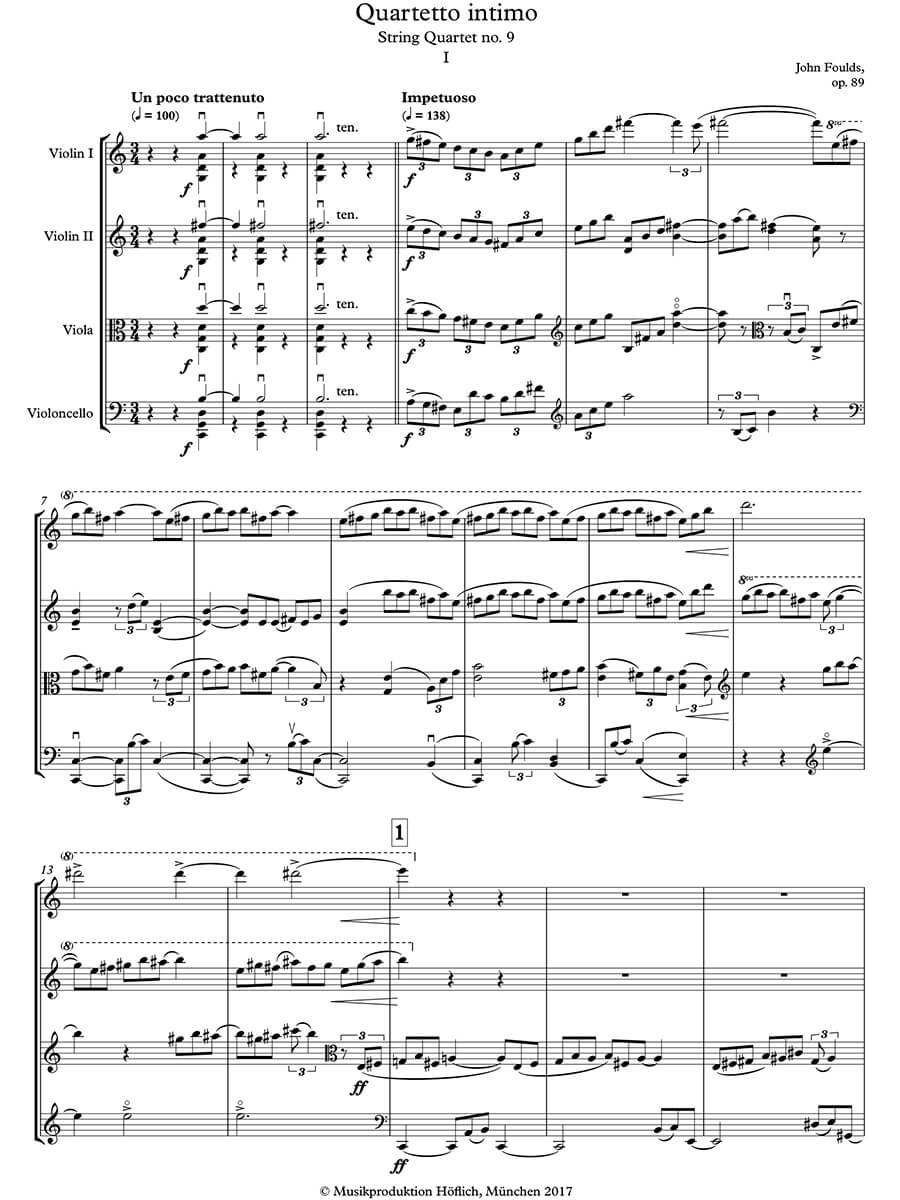Quartetto intimo op. 89 (score and parts /new print, engraved by Lucian Beschiu from the autograph score)
Foulds, John
34,00 €
Preface
John Herbert Foulds
(b. Manchester, 2 November 1880 – d. Calcutta, 25 April 1939)
Quartetto intimo op. 89
(1931-32)
I Poco trattenuto – Impetuoso p. 1
II Lento introspettivo p. 16
III Pasquinade. Con umore p. 21
IV Colloquy. Serioso p. 33
V Finale. Energico passionato p. 36
John Foulds is, to my mind, perhaps the greatest twentieth-century composer of genius to be entirely ignored, not only in England, but altogether. His wholly original music exudes freedom, lightness, immediacy, and a joy of discovery capable of touching and thrilling the listener in a unique way. Foulds was at once a pioneer, a true adventurer, a comprehensive master of form, a vivacious practicing musician as a conductor, cellist, and pianist, an insatiable explorer, a prime example of unlimited stylistic versatility, a tireless innovator, and the possessor of a critical and free-thinking mind. Above all he was a man who always strove for the utmost while remaining ever cognizant of his human inadequacy. This lent him a natural modesty and enabled him to come closer and closer to his actual goal of reaching absolute freedom, of being an “enlightened one.” He found the crucial elements for his quest in Eastern culture, as handed down by the “masters of wisdom” in Central Asia and India, and sought to combine them with constructive elements of Western culture to fashion a higher unity. None of the personal setbacks and the tragic sides of his life are imposed on the listeners of his music, which invariably speaks a warm-hearted, unsentimental, and authentic language.
John Herbert Foulds was born in Manchester on 2 November 1880 as one of four children of a professional bassoon player. His ancestors were French-based Jewish bankers, one of whom, Achille Fould, rose to become Minister of Finance under Napoleon III. Foulds’s own family had little money, but indulged all the more in music, for which John revealed an early gift. He began to take piano lessons at the age of four, after which he switched to the oboe before making the cello his main instrument. His earliest compositions were produced at the tender age of seven. Little is known about him in these years except that his childhood was not very happy. He ran away from home at the age of thirteen, becoming a professional orchestral musician and undertaking journeys that took him as far afield as Vienna, where he met Bruckner. In 1900 he joined the Hallé Orchestra during it legendary period under Hans Richter.
Among Foulds’s early compositions are several string quartets, one of which, written in 1898, “tentatively experimented
[…] with smaller divisions than usual of the intervals of our scale, i.e. quarter-tones. Having proved in performance their practicability and their capability of expressing certain psychological states in a manner incommunicable by other means known to musicians, I definitely adopted them as an item in my composition technique.” Foulds thus became the first European composer to call for quarter-tones. However, he showed no interest in the institutionalized use of a quarter-tone scale (it is nothing but a further subdivision of the artificial well-tempered semitonic scale) and always openly criticized its misuse: “The effect therefore is somewhat as if a poet should retell the old, old story of Cinderella in words every one of which should contain a ‘th’.” Time and again we find, in Foulds’s slow movements, polished quarter-tone passages conveying a strange sensation of wildness and splendid irregularity. His tone-poem Mirage of 1910 is an early example of such music. It was preceded by Foulds’s first major success, when Henry Wood premièred his Epithalamium (op. 10) at the Queen’s Hall Proms in 1906. Several long passages of Mirage clearly reveal the influence of Richard Strauss, who is equaled only by Edward Elgar as the obviously formative figure in Foulds’s early style. His elaborate sense of timbre is already well-developed in these early works, which constantly invite comparison with the subtleties of French orchestration.
Read full preface > HERE
Score Data
| Special Edition | Foulds Edition |
|---|---|
| Genre | Chamber Music |
| Size | 225 x 320 mm |
| Printing | Reprint |
| Specifics | Set Score & Parts |
| Pages | 134 |
